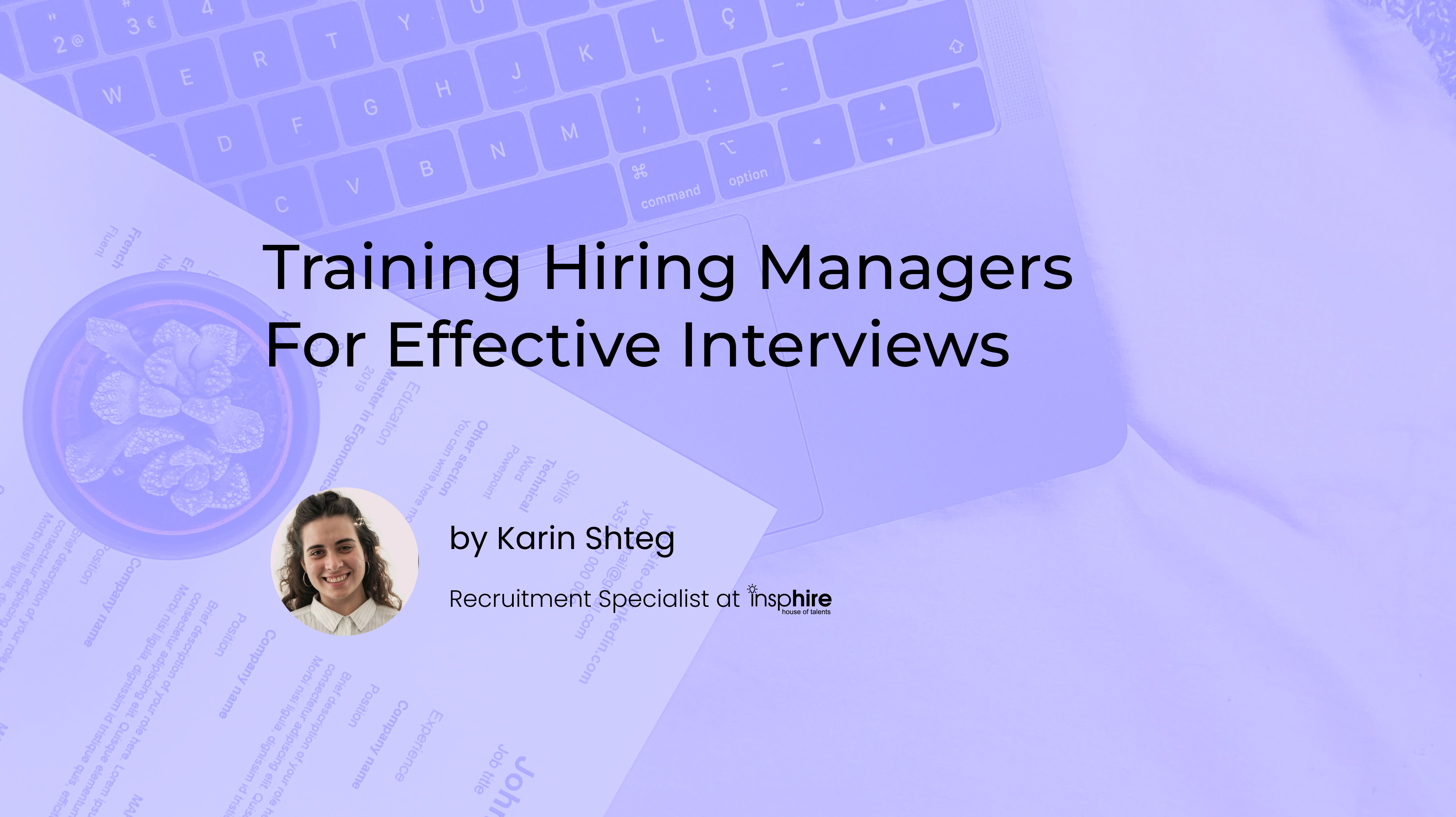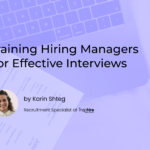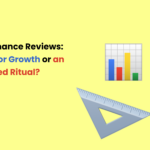by Karin Shteg, Recruitment Specialist at InspHire
When it comes to hiring the right talent, the role of a hiring manager is crucial. However, many hiring managers are not recruiters, and they often lack the experience or confidence needed to conduct interviews effectively. Unlike recruiters who regularly manage interviews, hiring managers typically perform interviews less frequently. This can result in lost opportunities if the interview process is not managed well.
Training hiring managers to conduct interviews with confidence and structure is essential for improving candidate experience and making more informed hiring decisions.
Why Do We Need to Train Hiring Managers to Conduct the First Interview?
Hiring managers are experts in their fields, but they may not always possess the specialized skills required for conducting interviews. Without sufficient training, they may inadvertently overlook key aspects of an interview or fail to engage candidates effectively. This could lead to a loss of top talent or a negative impression of the company.
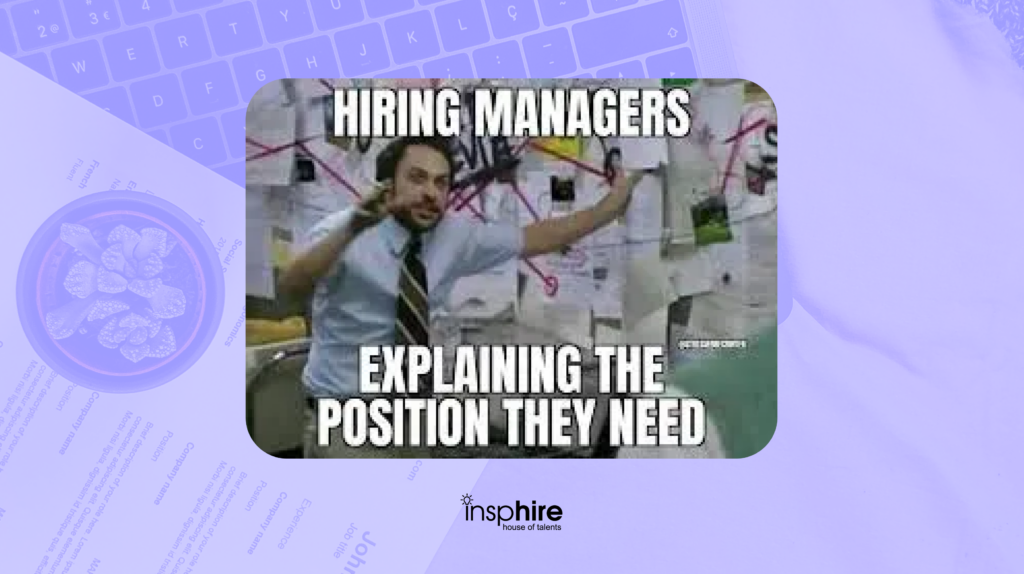
Recruiters, by contrast, conduct interviews daily and are skilled at managing the interview process. They know how to engage candidates, ask the right questions, and evaluate responses consistently. Providing training to hiring managers ensures they can effectively assess candidates in a manner that mirrors the best practices of experienced recruiters.
Step 1: Understand the Hiring Manager’s Current Interview Style
Before diving into training, it’s important to understand how the hiring manager conducts interviews. This helps identify areas for improvement and tailor the training accordingly.
Why? Understanding the current style allows you to pinpoint what is working well and where there may be gaps. It also creates a collaborative space to suggest changes based on best practices.
What to ask:
- “How do you usually conduct interviews?”
- “What do you feel works well for you?”
By understanding their approach, you can align their style with a more structured, standardized process.
Step 2: Start with the Basics: Introduce Yourself and the Company
First impressions matter. Encourage hiring managers to introduce themselves and the company to set the tone for a positive interview experience.
Key Actions:
- Begin the interview by introducing yourself and briefly explaining your role in the company.
- Provide a brief overview of the company and what the team or department is looking for.
- Ask open and closed-ended questions to gauge the candidate’s understanding of the role.
Also, give the candidate an opportunity to ask questions. This allows them to learn more about the company and role, which can improve their experience.
Example Question:
- “What interests you about this role?”
- “What are your expectations from this role?”
Finally, explain the next steps in the process to manage expectations, so candidates know when to expect follow-up communication.
Step 3: Encourage Structured Interviews
Interviews should be consistent and data-driven, not based solely on gut feeling. Encourage hiring managers to ask consistent questions to evaluate candidates objectively and effectively.
Key Guidelines:
- Prioritize asking clear, measurable questions.
- Focus on both technical skills and cultural fit.
- Avoid relying on intuition alone.
Example Question:
- “What specific technical skill or personal trait is a must-have for this role?”
The interview should assess both technical skills (e.g., familiarity with software or specific technical tasks) and behavioral traits (e.g., teamwork, leadership, adaptability). A strong candidate will possess both.
Additionally, ensure that the questions are open-ended to encourage the candidate to share detailed responses.
Example of an Open-Ended Question:
- “Can you tell me about a time when you worked with a team to solve a challenging problem?”
Avoid yes/no questions, as they limit the conversation and fail to provide deeper insights into the candidate’s abilities.
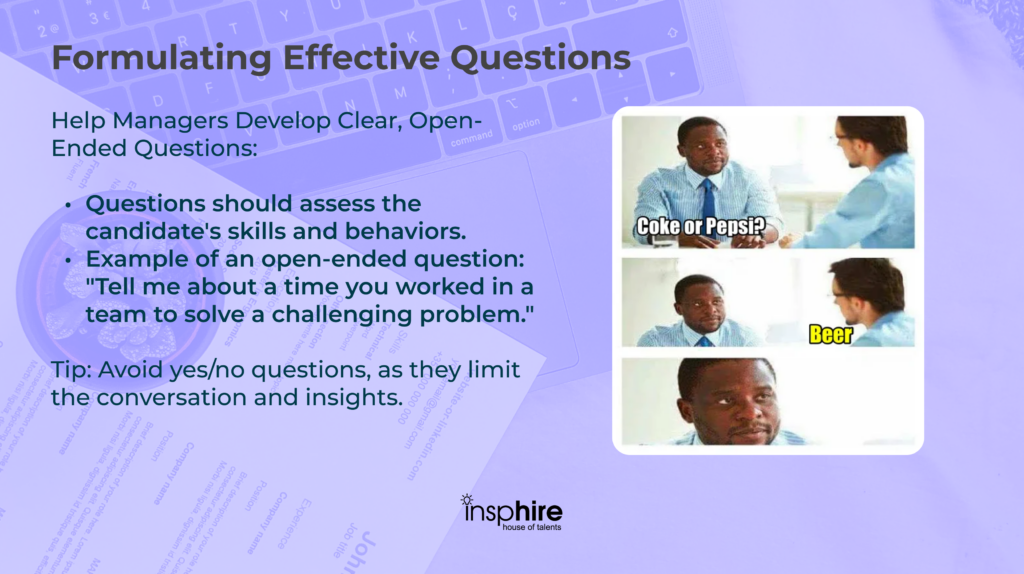
Step 4: Prepare Before the Interview
Effective interviewers always prepare. Encourage managers to take 10 minutes before each interview to review the candidate’s resume and identify areas to explore during the conversation.
Preparation Steps:
- Thoroughly review the candidate’s resume.
- Highlight specific gaps or points to explore further.
- If a candidate has provided a summary or portfolio, examine that as well.
Important Note: Hiring managers should avoid asking questions about non-relevant personal details, such as age, marital status, or military service, as these could lead to bias or discrimination.
Tools to Help Managers:
- Provide a list of leading questions for each role.
- Share templates that help structure the interview and maintain consistency.
- Allow managers to customize questions to fit the role, but encourage using a framework to keep things on track.
Step 5: Encourage Data-Driven Feedback
After each interview, the manager should collect feedback based on clear criteria, not just subjective impressions. This feedback should assess both technical and personal attributes of the candidate.
Post-Interview Sync: Schedule a follow-up meeting after a few interviews to discuss the performance of the interview process. Offer support in reviewing feedback and adjusting strategies accordingly.
Encourage Managers to Provide Constructive Feedback:
- Ask managers to focus on data rather than gut feelings.
- Discuss how well the candidate met the technical and personal criteria.
Step 6: Act as a Coach for Hiring Managers
Help hiring managers develop their interviewing skills by offering guidance throughout the process. Encourage consistency and fairness by ensuring that all candidates are evaluated based on the same criteria.
Be Supportive: Offer advice and answer questions whenever a manager feels unsure during the interview process.
Foster Consistency: Assist managers in ensuring all candidates are evaluated fairly and consistently. This helps build a fair hiring process that supports diversity and reduces bias.

InspHire is a 360° HR company taking a unique approach of specializing in building and improving HR processes and recruiting for global internet companies. Our approach and industry experience equipped us with deep knowledge and understanding in the world you work in. We cover every aspect of HR services that your company needs, from direct hire placements to trainings, employer branding, and welfare programs.

